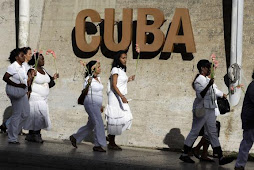Cuba is an enduring challenge to American foreign policy, politics
By Arthur Cyr, For the Deseret News
Published: Sunday, April 19 2015 12:00 a.m. MDT
Obama still has time to launch effective, sustained efforts at
bipartisan cooperation with Congress. The Republican majorities in both
houses make that essential for success in dealing with Cuba.
"You know, next time you're going to have to do better, Mr. President."
That was former President Dwight D. Eisenhower, talking with successor
John F. Kennedy about the devastating failed invasion of Cuba at the Bay
of Pigs in early 1961. JFK had reached out for political cover and also
insight regarding the military defeat and diplomatic disaster at the
start of his administration.
The current news about Cuba and President Barack Obama is considerably
more positive. On April 11, he met with Cuba's President Raul Castro.
Their conversation in Panama City, Panama, during the Summit of the
Americas, may prove of historic importance.
For the first time since the Castro dictatorship took power in early
1959, heads of the two governments engaged in a direct face-to-face
meeting. At the end of the historic meeting, the two men shook hands.
The summits have been held every three to four years since 1994, when
the first was held in Miami, Florida during the Clinton administration.
The Soviet Union had disintegrated, satellite regimes of Eastern Europe
had collapsed and China had announced capitalist reforms.
Cuba was excluded from previous summits. One byproduct of the meetings
was to underscore the isolation of the surviving but economically
struggling communist dictatorship. However, in recent years, Latin
American governments have pressed for inclusion.
The earlier Summit of the Americas, held in 2012 in Cartagena, Colombia,
initiated the opening to Cuba. All the participating heads of government
of Latin America and the Caribbean voted to invite Havana. Canada, as
well as the United States, voted against the proposal, but were
isolated. Obama's efforts at rapprochement reflect this evolving
political reality, which complements his own policy preferences.
President Raul Castro understandably generated considerable attention
from the media, as well as delegates. He ignored the request of
conference organizers that speakers keep to relatively brief remarks; he
spoke for nearly an hour. This recalled his predecessor and brother
Fidel Castro's propensity for exceptionally lengthy orations.
President Castro made news in February 2013 by announcing that he will
retire from his office in 2018. Brother Fidel stepped down from the same
post in 2008, after turning 85 years of age.
Likely successor Miguel Díaz-Canel Bermúdez is a loyal middle-aged
functionary with a reputation for bland bureaucratic effectiveness. If
iron control by the Brothers Castro does end, there may be opportunities
for greater reform. The growth of democracy throughout the Americas sets
the stage.
Fidel Castro greatly escalated Cold War tensions by alliance with the
Soviet Union soon after taking power. In 1960, he joined Soviet Premier
Nikita Khrushchev in a raucous visit to the UN in New York, punctuated
by Khrushchev pounding a shoe on a desk. JFK made Cuba a presidential
campaign priority in the same year.
Cuba has been a hot button in American politics ever since. Republican
Sen. Marco Rubio, from Florida with a Cuban heritage, is a strong critic
of the Cuba initiative. On April 13, he formally declared as a
presidential candidate.
History remains instructive. JFK recovered from the Bay of Pigs through
successful management of the exceptionally dangerous Cuban missile
crisis. The resulting nuclear test ban treaty with the Soviet Union won
Senate passage by a bipartisan 80-19.
Obama still has time to launch effective, sustained efforts at
bipartisan cooperation with Congress. The Republican majorities in both
houses make that essential for success.
Arthur I. Cyr is Clausen Distinguished Professor at Carthage College in
Wisconsin and author of "After the Cold War." He can be reached at
acyr@carthage.edu.
Source: Cuba is an enduring challenge to American foreign policy,
politics | Deseret News -
http://www.deseretnews.com/article/865626767/Cuba-is-an-enduring-challenge-to-American-foreign-policy-politics.html
Subscribe to:
Post Comments (Atom)





No comments:
Post a Comment